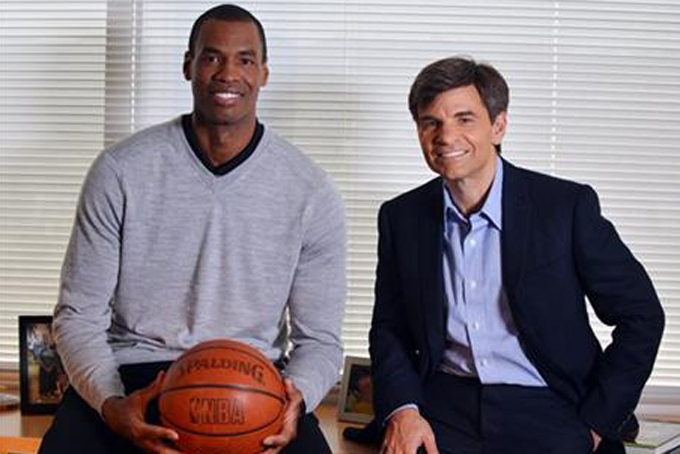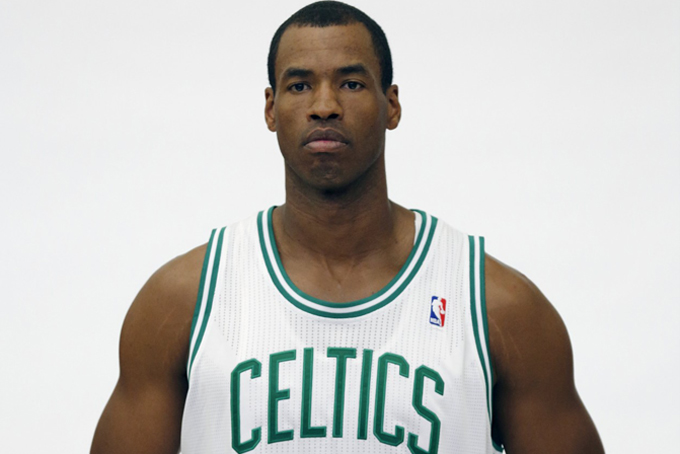
In this photo provided by ABC, NBA basketball veteran Jason Collins, left, poses for a photo with television journalist George Stephanopoulos, Monday, April 29, 2013, in Los Angeles. (AP Photo/ABC, Eric McCandless)
by Jeff Pearlman
(CNN) — It was merely a dream, wasn’t it?
That whole Jason Collins thing of six months ago — never happened, right? The headline news of his becoming the first openly gay active male professional athlete in a team sport. The Sports Illustrated cover. The supportive tweets from everyone ranging from Barack Obama and Bill Clinton to Jason Kidd and LeBron James. The interviews. The raves (“Game-changing!”). The altered landscape.

Remember when The Guardian newspaper called Collins’ emergence significant for LGBT acceptance … “as professional sports had long been seen as the final frontier”?
Remember when the Gay Lesbian Straight Education Network presented Collins with its courage award? Remember when the veteran NBA center was being likened to Jackie Robinson?
Well, eh, forget it. Forget the whole thing.
As you read this, Collins is likely sitting somewhere inside his California home, twiddling his thumbs, watching reality TV, waiting, hoping, waiting, hoping, waiting, hoping for the groundbreaking opportunity that looks, increasingly, unlikely to occur. Put differently: For one to actually become the first openly gay active male professional athlete in a team sport, one must be an openly gay active male professional athlete playing a team sport.
And Collins ain’t playing squat.
With the NBA opening in less than two weeks, it has become clear that the league’s 30 teams have no interest in Collins, a 34-year-old journeyman. From a purely basketball standpoint, this is understandable: Once a valuable role player on a New Jersey Nets team that reached back to back NBA Championship series in the early 2000s, Collins is a shell of his former self.
Playing with Boston and Washington last season, he averaged but 1.1 points and 1.6 rebounds in 38 games. He is — to be blunt — a slow, nonathletic player with creaky joints and no offensive repertoire of which to speak. Were this any other similarly submediocre player in any other sport, his departure would register nary a blip on the radar. He would vanish, and life would move on.
Jason Collins, however, ceased being ordinary the moment he announced he was gay.
To thousands upon thousands of Americans, he became a beacon of hope and a sign that maybe sexuality would matter not the in machismo-stuffed world of professional sports. If LeBron James and Kobe Bryant and Chris Paul could embrace a gay man as a teammate, what excuse would the loudmouth, homophobic blockhead at the construction site or law firm have for his close-mindedness?
Finally, things were about to change.
Only they weren’t because, well, nobody called. The NBA has been repeatedly defended in its inaction with predictable attacks on Collins’ game — too slow, too marginal, too worthless. Yet could somebody (anybody?) have at least invited him to training camp — land of myriad oafs and fringe players itching to land a job?
Hell, the Los Angeles Lakers’ preseason roster included Dan Gadzuric and Eric Boateng, two men with limited skill sets and without Collins’ great teammate/dogged worker resume. Hell, the Atlanta Hawks briefly employed David Lighty, a 6-foot-6 shooting guard with no redeeming NBA attributes. Hell, the New York Knicks, according to NBC Sports’ D.J. Foster, “have basically worked out everyone who has ever touched a basketball this offseason.” Everyone save Collins.
This isn’t a hard one to figure out.
As the late Branch Rickey of baseball fame repeatedly pointed out, change within the sports landscape doesn’t come easily.
Just as members of the Brooklyn Dodgers were loathe to share locker space with Robinson in the summer of 1947, many NBA players (whether they admit it publicly or not) were likely not thrilled by the idea of showering alongside a gay man even if they’d been showering alongside said gay man for more than a decade.
Adding Collins to a roster — even a preseason roster — would likely have meant awkwardness, confusion and weirdness.
There almost inevitably would have been conservative Christian teammates asking to change in a designated private space. Special press conferences would need to be arranged.
Gay rights groups would flock to the arena — and they’d be loud. And what of the slurs that fly across courts during practice with staggering regularity, and without much thought? What would happen the first time a Clipper or Piston or Spur uttered the word “f****t,” even if it were not directed at Collins?
Could all this trouble (and it would, inevitably, be trouble) be worth it for at best a seldom-used 12th man?
Answer: Absolutely.
Opportunities like this don’t happen often, and the NBA — arguably the most progressive of the four major American team sports — is failing miserably.
Where is Kidd, the Nets’ new coach and former Collins’ teammate, with a camp invite? Where is Mark Cuban, the forward-thinking Dallas Mavericks owner, with a pen and a contract? Where are the Golden State Warriors, the team whose arena is 18 miles from the spot where Harvey Milk was murdered? Where are the Lakers, a franchise desperately in need in grit and toughness? Where are the Miami Heat, whose bench could use a bruiser of Collins’ ilk?
How in the world could no one think to add Collins to a roster, if only to give his courageous first step the conclusion it deserves?
How are we letting this one slip away?
Editor’s note: Jeff Pearlman blogs at jeffpearlman.com. His most recent book is “Sweetness: The Enigmatic Life of Walter Payton.” Follow him on twitter @jeffpearlman.
